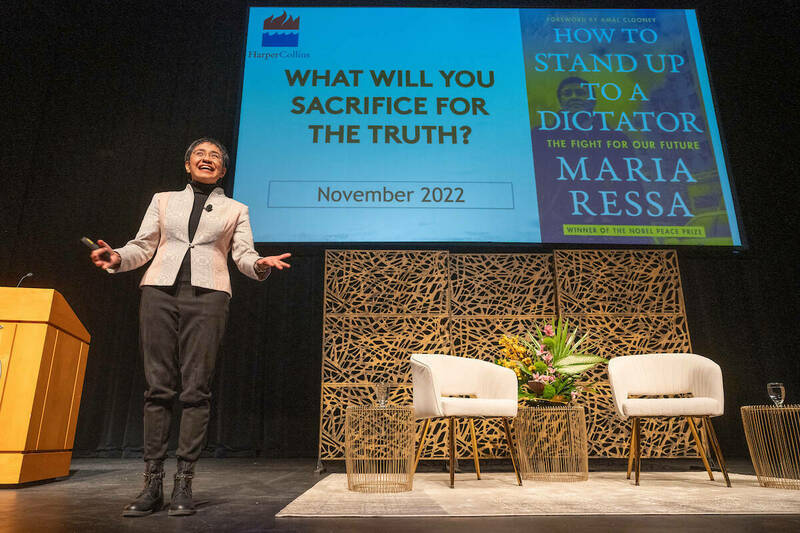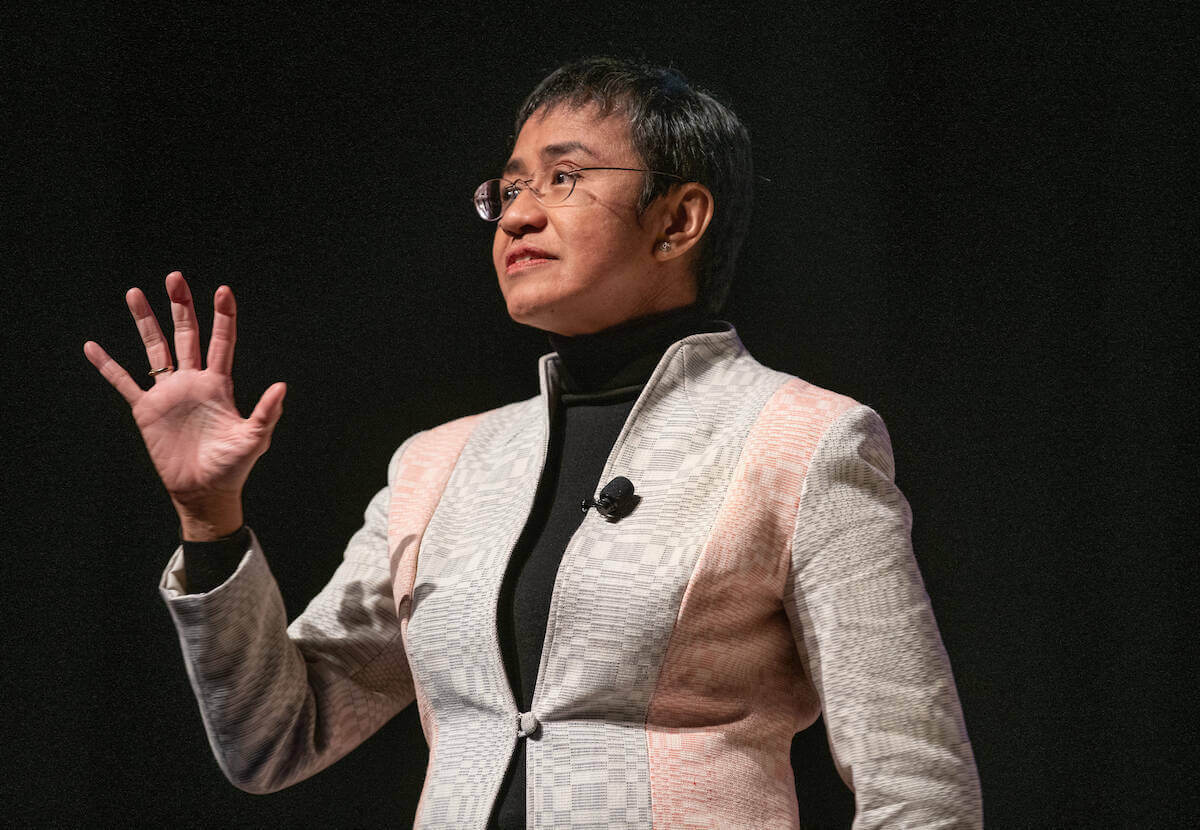 “If you don’t have facts, you can’t have truth. Without truth, you can’t have trust. Without these three, we have no shared reality. You can’t solve any problem, let alone have a functioning democracy.” Photography by Barbara Johnston
“If you don’t have facts, you can’t have truth. Without truth, you can’t have trust. Without these three, we have no shared reality. You can’t solve any problem, let alone have a functioning democracy.” Photography by Barbara Johnston

Maria Ressa has faced arrest warrants, vile personal attacks and threats of years in prison. Each challenge makes her stronger and more determined in her life’s mission.
“If you don’t have facts, you can’t have truth. Without truth, you can’t have trust. Without these three, we have no shared reality. You can’t solve any problem, let alone have a functioning democracy,” said Ressa, the Filipino and American journalist who won the 2021 Nobel Peace Prize for reporting on abuses of power and for working to safeguard freedom of expression.
Ressa spoke March 21 on campus at the Asia Leadership Forum, which is hosted by the University’s Liu Institute for Asia and Asian Studies.
The journalist reported on the abuse of power, use of violence and increasing authoritarianism of the regime of former Philippines President Rodrigo Duterte. Her multimedia startup, Rappler, has documented how Facebook and other social media outlets are used to spread false information and manipulate public discourse.
In less than two years, the Philippine government filed 10 arrest warrants against Ressa and sought to shut down Rappler. Each time, she posted bail and kept working. She and her company were cleared in January of tax evasion charges that many saw as an effort by Duterte to shut down critical reporting. She still faces more legal charges.
She is the author of a 2022 memoir, How to Stand Up to a Dictator: The Fight for Our Future.
Ressa, 59, was born in Manila and moved to the United States at age 9 with her family. After graduating from Princeton University, she returned to the Philippines and launched her journalism career. She was a CNN correspondent and bureau chief in Manila, and in Jakarta, Indonesia. Her work combating the spread of false news earned Ressa the cover of Time magazine as its 2018 Person of the Year representing journalists fighting disinformation.
Ressa’s appearance was moderated by Notre Dame global affairs and law professor Diane Desierto, an international human rights attorney and Liu Institute faculty fellow who is representing Ressa in some of the legal cases that have been filed against her.
Following are selections from Ressa’s talk.
On how society and democracy have changed as a result of social media:
“This is my 37th year as a journalist and I’ve never lived through anything like this. This is like living on quicksand. And I can only imagine what your life is like, especially if you’re Gen Z, if you’re searching for meaning and you look for it (on a smartphone) — where the outrage attention economy tries to keep you scrolling, right? This is what we have done to this incoming generation.”
What she has witnessed and reported on in recent years in the Philippines and other countries:
“What we saw was death by a thousand cuts of our democracy. I used to study the way Al-Qaeda — that virulent ideology — spread globally, hijacked homegrown movements and then radicalized individuals. What we saw was, essentially through social media, geopolitical power was able to go to the molecular levels of our democracies.”

On the power of tech companies and social media platforms:
“Every time I post on Facebook, Facebook uses machine learning to build a model of me that knows me better than I know myself. So that model then becomes Facebook’s property because they use machine learning. Now replace the word ‘model’ with ‘clone.’ That’s the power of big data. They can take our relationships (and) everything we post, and predictive analytics and machine learning will give them our clone.”
On the addictive nature of social media:
“A former Russian KGB chair, Yuri Andropov, said disinformation is like cocaine. You take it once or twice, you’re okay. But if you take it all the time, you become a changed person. All of us on social media have become changed people, because lies spread faster than facts.”
“What has happened with social media is they want to keep you scrolling. You, your fear, your anger, your hate. You stay on longer if your emotions are triggered. And when that happens, the platforms make more money. That’s the surveillance capitalism model.”
How protective legislation hasn’t kept up with the sea change created by technology companies:
“Human beings have been commodified. The last time we were commodified was the age of industrialization, where labor was the commodity. And remember, we had sweatshops, we had child labor and the governments — the United States in particular, but governments all around the world — created laws that protected labor. Labor created unions.”
Advice to fellow journalists on how to approach the job:
“Be vulnerable. Vulnerability oftentimes is seen as a weakness. But really — at least for me, and you can see I’m a pretty hardcore journalist — it’s actually been a strength. When you have to make quick connections, when people let you into their lives at these horrendous moments, both good and extremely tragic, if you don’t lower your shields, you don’t make the connection. And that makes a difference in the type of stories you get.”
“Our task is not to be popular. In fact, sometimes we write the things that are the most unpopular. . . . What I worry about oftentimes is that people can’t tell the difference between PR influencers and journalists. Journalists have this thing called standards and ethics, and we have a mission.”
Margaret Fosmoe is an associate editor of this magazine. She can be contacted at mfosmoe@nd.edu or @mfosmoe.